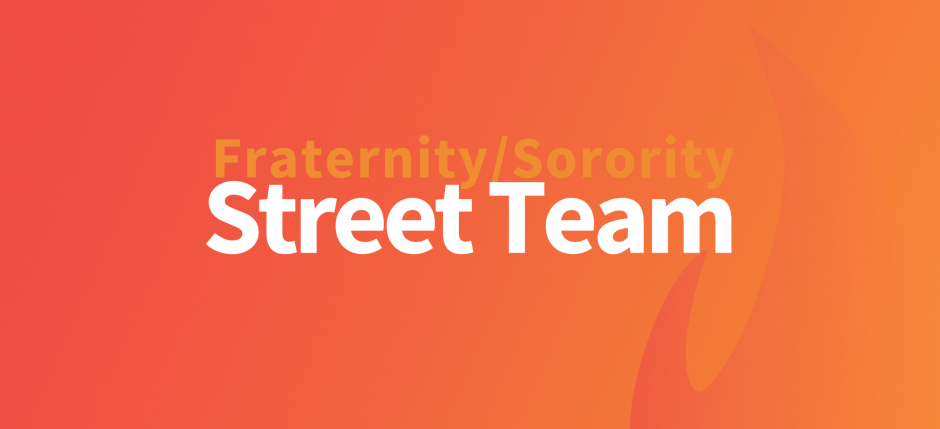Does Your Campus Have A “Fraternity/Sorority Street Team”?
Lately the Phired Up education and strategy team has been aggressively recommending a relatively new strategy for fraternity/sorority growth. It’s not overly complicated. It’s not technological. There are no complex methodologies or difficult formulas to memorize. And it’s a concept that has been used by the corporate, non-profit, and activists world for a long time.
Does your campus have a “Fraternity/Sorority Street Team?”
You might not be calling it that, but we’re seeing a bunch of campuses start to use it. Let’s describe this “street team” concept in its most simple terms.
What is a Fraternity/Sorority Street Team?
Imagine a small group of high performing fraternity/sorority members you can trust. Maybe 10, 20… probably no more than 30. These students could be from across councils, or just for one council. They might be made up of groups like “recruitment counselors,” “rush mentors,” etc. (or not). Put simply… they are a group of workhorses who are gathered together to work for the benefit of the fraternity/sorority community. They have 3 jobs. Their success can be measured by a) Did they increase registration/interest shown for joining? b) How many points of contact with non-affiliated students did they create? c) Did people stay in the joining/recruitment process through to the end?
The Three Jobs of The Fraternity/Sorority Street Team
“Drive Leads”
A Fraternity/Sorority Street Team member’s most important job is to get as many non-affiliated students as possible to indicate interest in fraternity/sorority life (by filling out a form, or by formally registering for recruitment). Remember, you can’t recruit who you don’t know. So every time we get a non-affiliated student to provide their name, contact information, and some data about them (as early as possible!), then chapters have a chance to start building relationships with them and start learning about them. AND the community has a chance to start promoting the larger idea of sorority/fraternity life as well as setting the expectations for what it means to be a fraternity/sorority member.
“Tell The Story”
The second job of the Fraternity/Sorority Street Team is to be the “face” of the community. They work to create a positive first impression through personal contact with non-affiliated students as often as possible. Whenever they have the chance, they’ll tell their personal story that reflects the core marketing narrative of the community (Don’t have a core marketing narrative? We can help). The best way to combat negative stereotypes – in fact the only way that works – is to share personal stories. The Fraternity/Sorority Street Team should share their personal version of the core marketing narrative as often as possible.
“Guide Prospects Through Joining”
The third job of Fraternity/Sorority Street Team is to serve as an unbiased guide, mentor, and “big sister/brother before they get a real big sister/brother” for potential members during their joining process. Hosting recruitment orientations, being present at major promotional events, mentoring and coaching small groups of prospective members, and communicating with potential members throughout their joining process to offer unbiased guidance and care for the important decision they will make when joining their fraternity/sorority of choice. Plenty of communities have some variation of a “recruitment counselor,” and this is that… not every community’s joining structure/policies have space for this third task, but every community will benefit from the first two tasks. [This role is sometimes excluded on particular campuses where the structure of joining doesn't allow for it.]
What are some examples of how a “Street Team” does these 3 jobs?
- The team gathers once per week (virtually or in person) from May through July to connect with incoming students via social media DMs/follows, text messaging campaigns, direct and personal email campaigns, or phone calls. (You could say these things.)
- Members of the team present during summer orientation sessions. Or, if that isn’t an option, they all record 2-minute videos about “Why fraternity/sorority is worth it” that are hosted somewhere on-line, and these get shared with parents and students during the summer.
- Members reach out to parents of incoming students directly over the summer offering to answer questions and offering to explain the benefits and details of fraternity/sorority life.
- The team hosts a series of virtual (or in-person) seminars over the summer and even into the first couple of weeks of school aimed at incoming or non-affiliated students. Consider “How To Network In College,” “How To Safely Socialize In College,” “Empowering Women For Success at ____ University,” “Finding Your Home at a PWI as a Student of Color,” “How To Balance Academics and College Life,” etc.
- The team first does it’s own Mind Joggers exercise, and then solicits top tier leaders that are friends from different chapters for 10 referrals each.
- The team executes names driving initiatives during the first days/weeks of school (success is only measured by how many names and contact information are collected)… Move-in day, tabling with surveys or a scholarship or a game, referral campaigns, and lots of other tactics like these.
- The team gives presentations at potential member orientations, etc.
- The team writes op-ed pieces for campus publications.
- The team serves in the traditional “recruitment counselor” role, even if that is in an unstructured joining process by simply caring for a small group of students who have indicated interest in fraternity/sorority life.
- So much more!
What’s the point? Why does a “Street Team” matter?
- If we can increase the amount of interest shown in fraternities and sororities, we can empower chapters to be more selective (which they want).
- If we can have a team of trusted, trained, and prepared members who are actively executing marketing strategies that share a positive narrative about Greek Life, that’s a very good thing (that we all need a lot).
- If we can prepare prospective members with (helpful peer-led guidance) to be empowered, educated, and prepared consumers, we can improve fraternity/sorority through market forces.
- If we can’t change everything about the way people join fraternities & sororities all at once and all right now… at least we can tackle what’s in our control. Increasing our contact frequency with non-affiliated students is in our control.
What would I get out of being on a “Street Team”?
How A Member Benefits. Think about the first person you connected with in your sorority/fraternity and how big of a part they played in everything good that’s happened to you since. You get to be that person for countless others. In addition, think about your future career. Think about the role that meeting and advancing relationships will play in your happiness, finances, and overall success. This is an opportunity to refine these skills on a broad scale. It all connects.
How Your Chapter Benefits. First, there will be more people showing interest in all fraternities and sororities, including yours. That’s a big deal. Second, your members who serve on the street team will be in tune with the needs, concerns, hesitations, desires, and vibe of prospective members.
How Your Council Benefits. This drives interest/demand in the “product” your member organizations are selling. There is no better way to gain respect as a council than to provide value to your stakeholders. A council should never “recruit” for a chapter, but they can organize initiatives like this to help chapters have a chance to succeed. Plus, this team can serve as a valuable leadership pipeline giving younger members an opportunity to shine on a bigger stage than their chapter alone.

